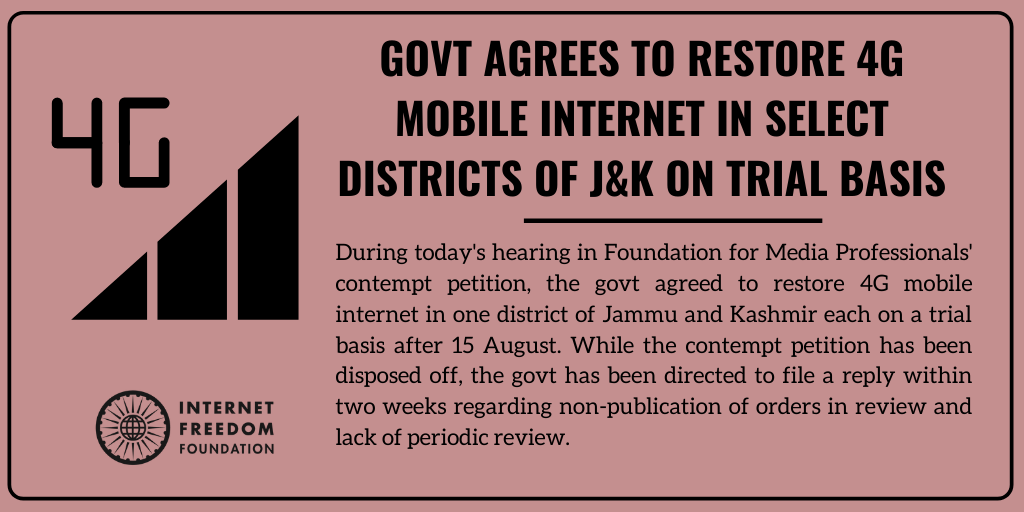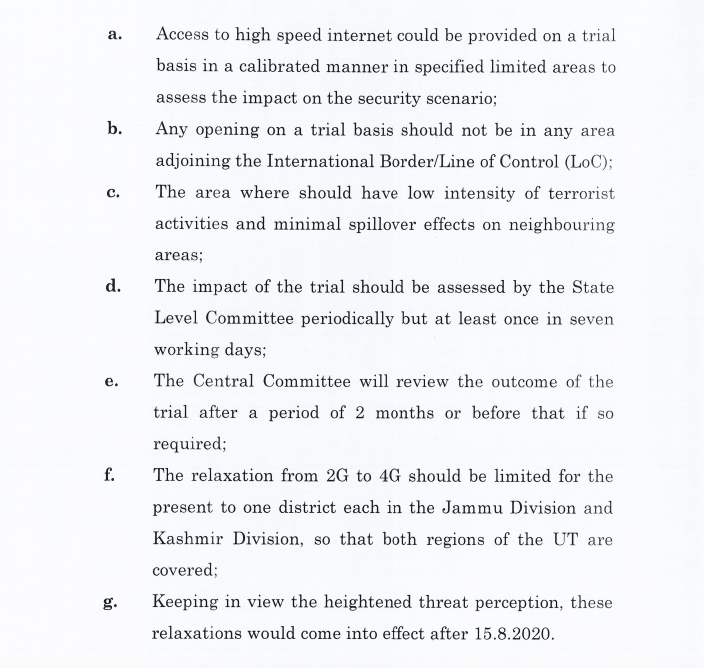
Tl;dr
In an incremental but significant step, the government has agreed to restore 4G mobile internet in one district of Jammu and Kashmir each on a trial basis after 15 August i.e. Independence Day. This has been stated in Union of India's additional affidavit filed last night and also confirmed by the Attorney General during today's hearing before the Supreme Court in Foundation for Media Professional's contempt petition relating to the internet restrictions in Jammu & Kashmir which recently crossed one year. While the contempt petition has been disposed off, the government has been directed to file a reply regarding non-publication of orders in review and lack of periodic review every five/seven working days.
Background
On 11 May 2020, the Supreme Court delivered its judgement in a petition filed by the Foundation for Media Professionals (FMP) seeking restoration of 4G mobile internet services in Jammu & Kashmir during the COVID-19 pandemic (Read more here). The Court constituted a Special Committee comprising (i) Secretary, Ministry of Home Affairs, (ii) Secretary, Department of Telecommunications, and (iii) Chief Secretary, Government of Jammu & Kashmir to immediately review the 4G mobile internet ban. In particular, the Special Committee was directed to examine the material placed on record by all parties and consider the viability of less restrictive alternatives suggested by the petitioner.
Since there was no information available in the public domain about the functioning of the Special Committee, FMP was constrained to file a contempt petition before the Supreme Court again on 09 June 2020. During the course of hearings in the contempt petition, the government revealed that the Special Committee had held two meetings since its constitution on 15 May 2020 and 10 June 2020, and it decided to defer the issue for two months since the security situation was allegedly not conducive to relaxation of internet restrictions (Read more here).
Additional Affidavit filed by UoI
The contempt petition was scheduled for substantive oral arguments today i.e. 11 August 2020 but the Union Government filed an additional affidavit last night which agreed to restoration of 4G mobile internet services in one district of Jammu and Kashmir each on a trial basis after 15 August i.e. Independence Day.
In its additional affidavit, the government has stated that the Special Committee held its third meeting on 10 August 2020 where it found that the threat perception in Jammu & Kashmir continues to be high and that internet speed restrictions did not have any impact on COVID-19 control measures, education or business. However, the Special Committee has decided that 4G mobile internet may be restored in select low risk areas in the below mentioned manner.

What happened during today's hearing?
Since the Union Government had agreed to restore 4G mobile internet in select districts of Jammu & Kashmir on a trial basis, much of today's hearing focused on how this process would be made transparent and accountable.
Mr. Huzefa Ahmadi, Senior Advocate appearing for FMP argued that the government had not complied with the Supreme Court's directions in Anuradha Bhasin v. Union of India because it had failed to publish any orders in review issued by the State Level Review Committee or the Special Committee. He further submitted that the changing circumstances must be reviewed every five/seven working days in compliance with Anuradha Bhasin v. Union of India. Since these concerns remained unresolved, he insisted that while the contempt petition may be disposed, the interlocutory application for directions should remain pending and the government should file a reply to it.
The Attorney General, Mr. K.K. Venugopal responded to these arguments by stating that all relevant orders had been published on the Government of Jammu & Kashmir's website. He undertook to file a reply to the interlocutory application responding to the petitioner's contentions about non-publication of orders in review and lack of periodic review every five working days. The Court has granted the government two weeks to file its reply to the interlocutory application and it has disposed off the contempt petition in light of the government's assurance regarding staggered restoration of 4G internet.
The matter is likely to be listed next after at least two weeks and we will keep you updated. FMP was represented in today's proceedings by a legal team led by Senior Advocate, Huzefa Ahmadi and consisting of Advocates Shadan Farasat and Bharat Gupta and IFF associated counsels, Vrinda Bhandari, Apar Gupta, and Devdutta Mukhopadhyay.
